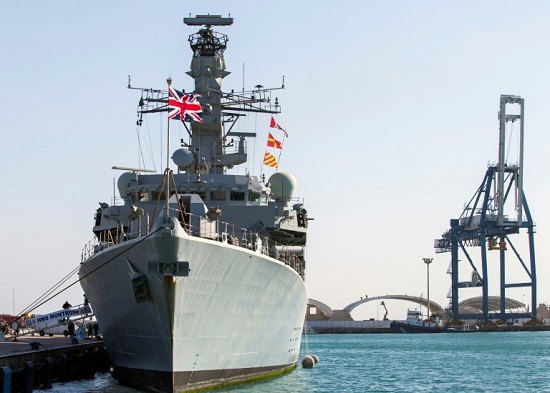This post has already been read 1688 times!
London said Thursday that Iranian military vessels tried to “impede the passage” of a UK oil tanker but were warned off by a British warship in a dramatic escalation of tensions with Tehran in the Gulf.
Iran’s Revolutionary Guards denied involvement but also cautioned both the United States and Britain that they would “strongly regret” the UK Royal Marines’ detention of one of the Islamic republic’s tankers off Gibraltar last week.
Wednesday’s incident in the flashpoint Strait of Hormuz occurred after US President Donald Trump raised the pressure by announcing that sanctions against Iran over its stepped-up nuclear activities would be “increased substantially” soon.
The rapid chain of events further complicates Britain and other European allies’ efforts to salvage a landmark nuclear accord with Iran from which Washington pulled out last year.
CNN initially cited US defence sources as saying that armed Iranian vessels belonging to the Revolutionary Guards tried to seize the tanker but were driven off by a Royal Navy frigate.
The UK defence ministry said only that the Iranian boats tried to “impede” a commercial vessel called British Heritage. The 274-metre (899-foot) supertanker is owned by the British energy giant BP and can carry a million barrels of oil.
“We are concerned by this action and continue to urge the Iranian authorities to deescalate the situation in the region,” a Downing Street spokesman said.
– ‘Turned away’ –
The UK defence ministry said that “three Iranian vessels attempted to impede the passage of a commercial vessel, British Heritage, through the Strait of Hormuz.”
“HMS Montrose was forced to position herself between the Iranian vessels and British Heritage and issue verbal warnings to the Iranian vessels, which then turned away,” the ministry statement said.
 AFP /Tensions in the Gulf
AFP /Tensions in the Gulf
Iran’s Revolutionary Guards — a vast and powerful security organisation that the United States blames for staging several tanker attacks since May — denied trying to seize or impede the UK tanker.
“There has been no confrontation in the last 24 hours with any foreign vessels, including British ones,” the Revolutionary Guards said in a statement.
BP said in a brief statement that its “top priority is the safety and security of our crews and vessels” but made no further comment.
– ‘Path of diplomacy open’ –
The episode adds further fuel to a volatile mix of brinkmanship and sabre rattling in a region already unsettled by the Trump administration’s nuclear stand-off with Tehran.
Revolutionary Guards deputy commander Ali Fadavi called Britain’s seizure of Iran’s tanker “stupidity… a trait the American president has in spades, and the British to some extent”.
“If the enemy had made the smallest assessment they wouldn’t have done this act,” Fadavi said.
 AFP/File / Nicholas KammUS President Donald Trump pulled the United States out of a nuclear deal with Iran and reimposed sanctions on Tehran, hitting the banking and oil sectors hard
AFP/File / Nicholas KammUS President Donald Trump pulled the United States out of a nuclear deal with Iran and reimposed sanctions on Tehran, hitting the banking and oil sectors hard
Officials in Gibraltar — a British overseas territory on Spain’s southern tip — said the cargo was believed to be destined for Syria.
Damascus is subject to EU sanctions while the United States has its own sets of trade restrictions on Iranian oil.
Iran has increased uranium enrichment in response to the Trump administration’s decision last year to pull out of a controversial nuclear agreement world powers signed after a decade of talks with Tehran in 2015.
It surpassed one limit set in that deal a month ago and breached a second one on Monday.
– Compliance ‘without delay’ –
Britain and other European nations have been trying to preserve the deal by setting up their own independent trade mechanism that evades US sanctions on Tehran.
 IRANIAN PRESIDENCY/AFP/File / HOIranian President Hassan Rouhani has warned Britain of ‘consequences’ over the detention of an Iranian oil tanker off the coast of Gibraltar
IRANIAN PRESIDENCY/AFP/File / HOIranian President Hassan Rouhani has warned Britain of ‘consequences’ over the detention of an Iranian oil tanker off the coast of Gibraltar
But Iran’s decision to push ahead with higher enrichment is putting the European strategy under strain.
European parties to the agreement issued a tough joint statement on Tuesday saying Iran must reverse its activities and return to full compliance “without delay”.
Fellow deal sponsors Russia and China lay the blame for the confrontation on the United States.
“The reasons for this are clear. This is Washington’s deliberate, premeditated course to exacerbate tensions,” Russia’s Deputy Foreign Minister Sergei Ryabkov said on Thursday.
Tehran says it has lost patience over perceived inaction by European countries more than a year after Trump unilaterally pulled the US out of the agreement and started to impose tough sanctions.
[AFP]



